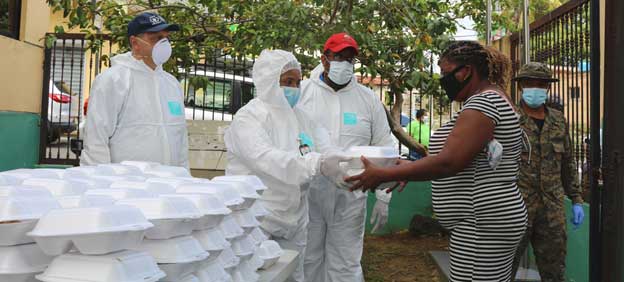A Time for Systemic Solutions in Latin America & the Caribbean

NEW YORK, Jun 24 (IPS) - The first wave of COVID-19 never ended in Latin America and the Caribbean (LAC). Since the region became a hotspot for the pandemic in June 2020, successive waves have continued to build upon the first.
Despite being home to just 8% of the world’s population, the region has suffered 20% of total confirmed COVID-19 cases and 32% of total confirmed COVID-19 deaths. The relentless spread of the virus has brought with it not only the tragic loss of so many lives, but also devastating economic and social damages.
Poverty and hunger are once again on the rise in the region and growth prospects are bleak. With limited access to vaccines in many countries, hopes for a return to “normal” remain distant.

What went so wrong? With adequate warning of the spreading virus, many countries in the region responded swiftly at the onset with strict containment measures.
Unfortunately, in LAC it was not only the response to the pandemic that mattered – but fundamentally, the “pre-existing conditions” that characterized the region prior to the pandemic’s arrival.
These pre-existing conditions, or structural weaknesses, made countries in the region more vulnerable to the multiple and interconnected crises associated with COVID-19.
UNDP’s recently launched Regional Human Development Report, “Trapped: High Inequality and Low Growth in Latin America and the Caribbean”, looks at two of these conditions: high-inequality and low-productivity.
It explores how underlying factors related to ineffective governance work to propel these outcomes in a mutually reinforcing vicious cycle (a “trap”). In particular, it highlights how the concentration of power in the hands of “the few” works to distort public policies in ways that both perpetuate existing patterns of inequality and hold back productivity growth in the region.
Exiting this trap will only happen if countries take bold action to embrace systemic solutions that consider the complexity of the dynamics between governance, inequality, and productivity. For years, countries in the region have invested in various solutions to address these challenges.

However, many of these responses were short-term, designed to separately address different symptoms of a much deeper problem. This has left countries with a large set of fragmented and costly policies that segment the labor market, provide erratic risk protection to households, do not redistribute income sufficiently towards lower-income groups, and bias the allocation of resources in ways that punish productivity and stable growth.
The region cannot afford to stay stuck on this path.
While the pandemic has accelerated the urgency of this challenge, citizens were already demanding change before we knew what COVID-19 was. As citizens poured onto the streets of LAC in late 2019, it became eminently clear that “business as usual” was not working for “the many.”
LAC countries made important development progress over the past thirty years, but the events of more recent years have revealed just how fragile that progress was. We celebrated a temporary reduction of inequality in the 1990s and early 2000s, but it was both insufficient and unsustainable—largely propelled by a commodity boom, targeted cash transfers, and a compression of the wage gap between skilled and unskilled workers.
While many countries achieved middle-income status, they have been unable to consolidate themselves as middle-class societies. Millions have been left behind as opportunities have fallen short of people’s aspirations for their own lives and their expectations of their governments.
What we have learned is that there is no single “silver bullet” policy that can change this. The region already has many “good” policies in place. The challenge we face now is a structural one.
It requires rethinking the foundations of our systems from a longer-term perspective and considering the interconnected ways in which these issues work to reinforce one another in positive or negative directions.
While there are many potential entry points, the potential for universal social protection systems that ensure that everybody is protected, that income is redistributed towards those in need, that the policies deployed to achieve these aims provide incentives to firms and workers to increase productivity, and that the sources of revenue are sustainable, is particularly important.
This requires a principle of universality understood in three complementary dimensions: (i) All the population exposed to a given risk needs to be covered through the same program; (ii) The source of financing should be the same for each program, based on the type of risk covered; and (iii) When programs provide in kind benefits, quality should be the same for all.
A social protection system built around these universal principles offers the region a route to increasing spending in social protection while strengthening the foundations of long-term growth, and a path to enhance social inclusion.
Moving in this direction could represent “a third moment” in the history of social protection in the region. The first moment occurred over 75 years ago, when countries began the construction of their social protection systems; and the second moment occurred in the early 1990s, as countries emerged from the “lost-decade” of the 1980s.
It is possible that the current moment of crisis associated with COVID-19 may open the required political space for this third moment to take place, as countries contemplate substantial changes to their social protection and taxation systems in their efforts to contain social damage, restore fiscal balances, and resume growth.
Follow @IPSNewsUNBureau
Follow IPS New UN Bureau on Instagram
© Inter Press Service (2021) — All Rights Reserved. Original source: Inter Press Service

